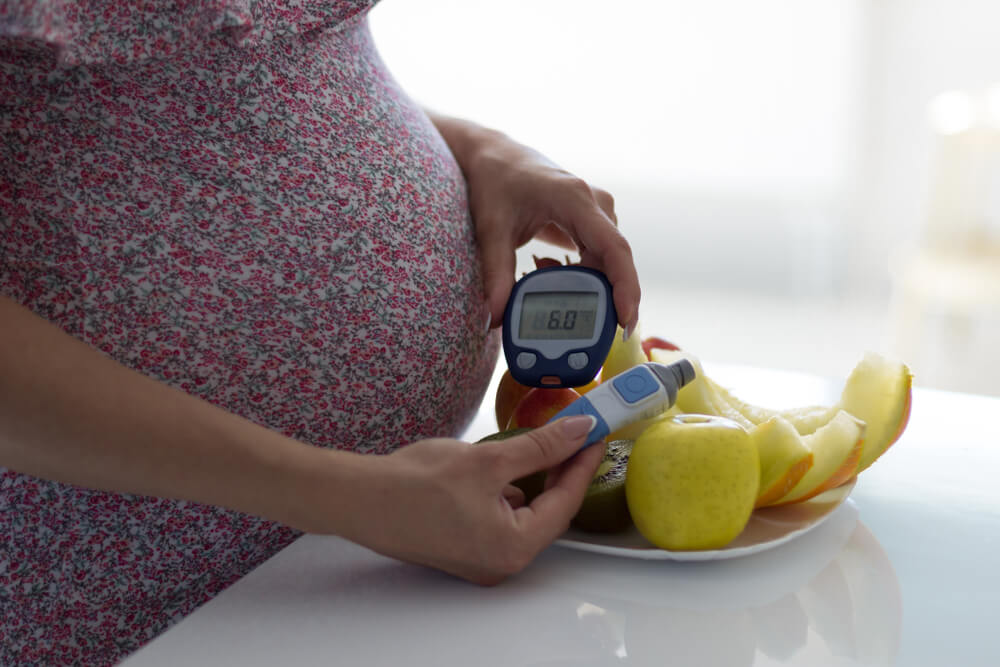Gestational diabetes in the United States is fairly common, affecting up to ten percent of pregnancies in the US each year. You’ve received the results of your gestational diabetes test and it looks like you’re positive too. What does this mean for you? What does gestational diabetes treatment look like? What’s the prognosis for this condition? This article focuses on gestational diabetes, the possible gestational diabetes treatment, diet for gestational diabetes, and more. If you’re looking for a detailed overview of this condition, you’re in the right spot. However, before applying some of these tips, consult with a high-risk obstetrics specialist. This way, you’ll ensure that the diagnosis and treatment method are custom-tailored to your needs.
With that in perspective, let’s begin.
What is Gestational Diabetes?
Receiving a positive gestational diabetes test can be daunting, especially if you’re not too familiar with the condition. So, let’s briefly define gestational diabetes. In short, this condition refers to a type of diabetes during pregnancy. What makes this diabetes type unique is that it occurs in expecting mothers who aren’t already diabetics. Managing gestational diabetes and receiving proper gestational diabetes treatment will ensure that both the mother and the unborn child are healthy and happy.
The main reason why you may receive a positive gestational diabetes test is that your body cannot produce enough insulin during pregnancy. As a reminder, the pancreas produces the insulin hormone to act as a “key” to allow blood sugar into your cells for energy use.
When you are pregnant, your body will produce more hormones, and it will go through drastic changes (for instance, weight gain). The fluctuation in hormone levels will cause the cells to utilize insulin less effectively, causing insulin resistance. Therefore, when a patient is diagnosed with insulin resistance, her body will require more insulin.
Every pregnant woman has some degree of insulin resistance in the later phases of pregnancy. Nevertheless, some women will develop insulin resistance before pregnancy. Typically, these patients begin pregnancy with a boosted need for insulin, and they have a higher chance of having gestational diabetes.
You will require an accurate diagnosis for proper treatment. We recommend experts like Dr. Francisco Jimenez. Always take your time when choosing a healthcare specialist, as this way, you’ll receive the best treatment and the highest-grade results.
The Gestational Diabetes Test: How Does it Work?

If you want a healthy pregnancy without complications, it’s best you get a gestational diabetes test. This way, if you are diagnosed with the condition, you can take the necessary precautions and start with treatment as soon as possible.
Usually, gestational diabetes appears around the twenty-fourth week of pregnancy. This means that if you are pregnant, you will get tested between the twenty-fourth and twenty-sixth week
Women who have a higher risk for the condition may test earlier (if approved by the medical expert). For example, if the blood sugar levels are higher than usual in the early stages of pregnancy, the test may show that you have type 1 or type 2 diabetes.
What is the risk of a positive gestational diabetes test? If you have tested positive for this condition and you don’t receive proper treatment, your unborn child could be at high risk of:
- Being over nine pounds, making delivery challenging.
- Having low blood sugar.
- Being born prematurely.
- Developing type 2 diabetes growing up.
After giving birth, a woman’s blood sugar will return to normal levels. Unfortunately, however, approximately half of the women with this condition can develop type 2 diabetes later in life. Luckily, there are many ways to reduce your risk of type 2 diabetes, including maintaining a healthy weight, getting enough exercise, and consuming a nutrient-dense diet.
The gestational diabetes test involves simple blood tests. You might require the oral glucose tolerance test, the glucose challenge test, or both. These mentioned tests will reveal how well the body utilizes glucose.
The first gestational diabetes test is usually the glucose challenge test or the glucose screening test. During this test, the medical expert will ask you to drink a glucose-rich liquid and draw your blood for screening one hour later. If the test results show high blood glucose levels (140 or more), you will require an oral glucose tolerance test. If the blood glucose results are high too (200 or more), you might be diagnosed with type 2 diabetes.
Best Gestational Diabetes Treatment
So, you’ve been diagnosed with gestational diabetes. What are your next steps? Here are some expert-approved gestational diabetes treatment methods for better health.
Insulin for Gestational Diabetes
In some cases, your medical professional will recommend insulin for gestational diabetes. Detemir, aspart, and insulin lispro are approved for use during pregnancy. However, when it comes to insulin for gestational diabetes, it’s important to note that insulin glargine is unapproved in pregnancy. Your healthcare provider will advise you on the best option, depending on your needs.
Follow a Diet for Gestational Diabetes
Your doctor might recommend following a special diet for gestational diabetes. The best-balanced diet for expecting mothers with gestational diabetes includes consuming various nutrient-rich foods. Generally, a diet for gestational diabetes includes:
- Moderate amounts of healthy fats and lean proteins (such as walnuts, pecans, almonds, olive oil, turkey, chicken, salmon, lamb, tofu, etc.)
- Whole grains (such as cereal, bread, pasta, quinoa)
- Starchy vegetables (peas and corn)
- Fresh fruits and vegetables
Moreover, a diet for gestational diabetes will include consuming three moderate meals per day with at least one healthy snack daily. So make sure to stay on track with your meals and avoid skipping any. Also, ensure that you get your micro and macronutrients (vitamins, proteins, fat, and carbohydrates) daily, as this will help stabilize your blood sugar levels.
What about sweets? Pregnancy can elevate cravings for sweets and junk foods. We believe in keeping things balanced and having food freedom. Although a piece of candy a day won’t wreck your diet, make sure to limit junk food quantities. For best results, you can substitute junk foods for healthier alternatives. For instance, instead of plain chocolate, choose dark chocolate with a high cocoa percentage.
Get Some Exercise
Exercise is good for the mind, the body, and the soul, and it’s also fantastic for gestational diabetes. We recommend keeping yourself active, even on days when you don’t feel like moving your body. Regular physical activity doesn’t have to be intense. In fact, during pregnancy, you want to engage in more gentle exercise such as brisk walks, yoga, or swimming. Of course, consult with your medical expert for guidance.
Keep Up with Your Prenatal Appointments

Staying on track with your prenatal appointments is crucial for a safe and healthy pregnancy. For most uncomplicated pregnancies, expecting mothers should visit their healthcare provider every four weeks. Between the twenty-eight and thirty-sixth week, mothers can visit their doctor every two weeks for a check-up.
During prenatal care appointments, the midwife, nurse, or doctor will likely:
- Check urine
- Update medical history
- Check for any swelling
- Check for blood pressure and weight
- Measure the growth of the fetus
- Listen to the fetus’s heartbeat
- Feel the baby in the baby to analyze its position
As the delivery approaches, soon-to-be parents should see their provider on a weekly basis.
Book Your First Consultation
Have you been diagnosed with gestational diabetes? Worry not; with us, you’re in safe hands. Give us a call today to schedule your first appointment.


